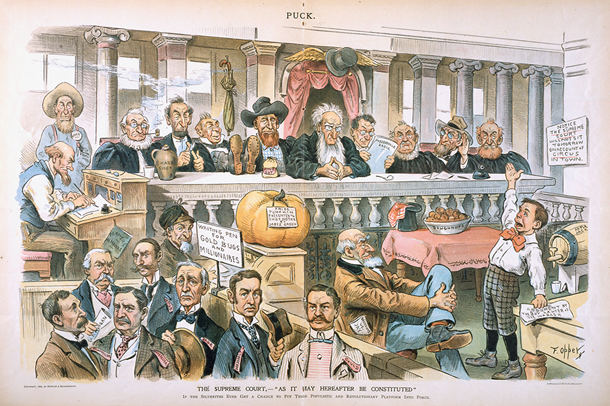As part of the Patient Protection and Affordable Care Act (ACA), P.L. 111-148, as amended, Congress enacted a “minimum coverage provision,” which compels certain individuals to have a minimum level of health insurance (i.e., an “individual mandate”). Individuals who fail to do so may be subject to a monetary penalty, administered through the tax code. Congress has never compelled individuals to buy health insurance, and there has been significant controversy and debate over whether the requirement is within the scope of Congress’ legislative powers.

Shortly after ACA was enacted, several lawsuits were filed that challenge the individual mandate on constitutional grounds. While some of these cases have been dismissed for procedural reasons, others have moved forward. These challenges have now reached the Supreme Court. During the last week of March, the Court heard arguments in HHS v. Florida, a case in which attorneys general and governors in 26 states as well as others brought an action against the Administration, seeking to invalidate the individual mandate and other provisions of ACA. Besides evaluating the constitutionality of the individual mandate, the Court is examining the question of whether the Anti-Injunction Act currently prevents the Court from ruling on the merits of the case. It also is considering the extent to which the minimum coverage provision can be severed from the remainder of ACA, if it is found to be unconstitutional. Finally, the Court is analyzing ACA’s expansion of the Medicaid program and whether it unconstitutionally “coerces” states into compliance with federal requirements.
While there is no specific enumerated constitutional power to regulate health care or establish a minimum coverage provision, Congress’s taxing power or its power to regulate interstate commerce may be pertinent. With regard to the taxing power, the requirement to purchase health insurance might be construed as a tax and upheld so long as it was found to comply with the constitutional restrictions imposed on direct and indirect taxes. On the other hand, opponents of the minimum coverage provision may argue that since it is imposed conditionally and may be avoided by compliance with regulations set out in the statute, that the requirement may be more accurately described as a penalty. If so, the taxing power alone might not provide Congress the constitutional authority to support this provision.
In evaluating the minimum coverage provision under the Commerce Clause, one of several issues that may be examined is whether the individual mandate is a regulation of economic activity. Some argue that the requirement to purchase health insurance is economic in nature because it regulates how an individual participates in the health care market, through insurance or otherwise. Conversely, others argue that forcing individuals to participate in commerce in order to regulate them goes beyond the bounds of the clause.
This report analyzes certain constitutional issues raised by requiring individuals to purchase health insurance under Congress’s authority under its taxing power or its power to regulate interstate commerce. It also addresses whether the exceptions to the minimum coverage provision to purchase health insurance satisfy First Amendment freedom of religion protections. Finally, this report discusses some of the more publicized legal challenges to ACA, as well additional issues that are currently before the Court.
“Requiring Individuals to Obtain Health Insurance: A Constitutional Analysis,” CRS Report R40725, April 6, 2012 (42-page PDF![]() )
)

A free download of our Pocket Constitution is available on Scribd.
While supplies last, single copies of this Pocket Constitution are available at no charge. For details, see TCNConst.com
More
- The United States Constitution and Declaration of Independence
- Pocket Constitution
- Patient Protection and Affordable Care Act (ACA) – Wikipedia
- Patient Protection and Affordable Care Act Cases – United States Supreme Court
- ACA Federal Funds Tracker – Kaiser Family Foundation
- “Affordable Care Act: Litigation Resources,” CRS Report R42437, March 23, 2012 (13-page PDF
 )
) - “Federalism Challenge to Medicaid Expansion Under the Affordable Care Act: Florida v. Department of Health and Human Services,” CRS Report R42367, February 21, 2012 (20-page PDF
 )
)
For more than 40 years, TheCapitol.Net and its predecessor, Congressional Quarterly Executive Conferences, have been teaching professionals from government, military, business, and NGOs about the dynamics and operations of the legislative and executive branches and how to work with them.
Our custom on-site and online training, publications, and audio courses include congressional operations, legislative and budget process, communication and advocacy, media and public relations, testifying before Congress, research skills, legislative drafting, critical thinking and writing, and more.
TheCapitol.Net is on the GSA Schedule, MAS, for custom on-site and online training. GSA Contract GS02F0192X
TheCapitol.Net is now owned by the Sunwater Institute.
Teaching how Washington and Congress work ™

